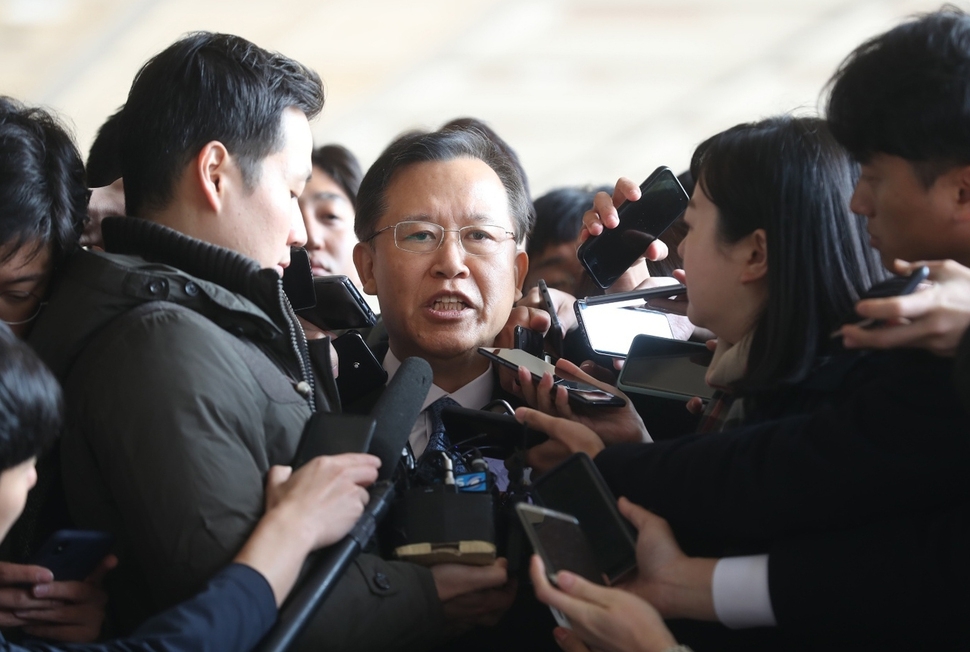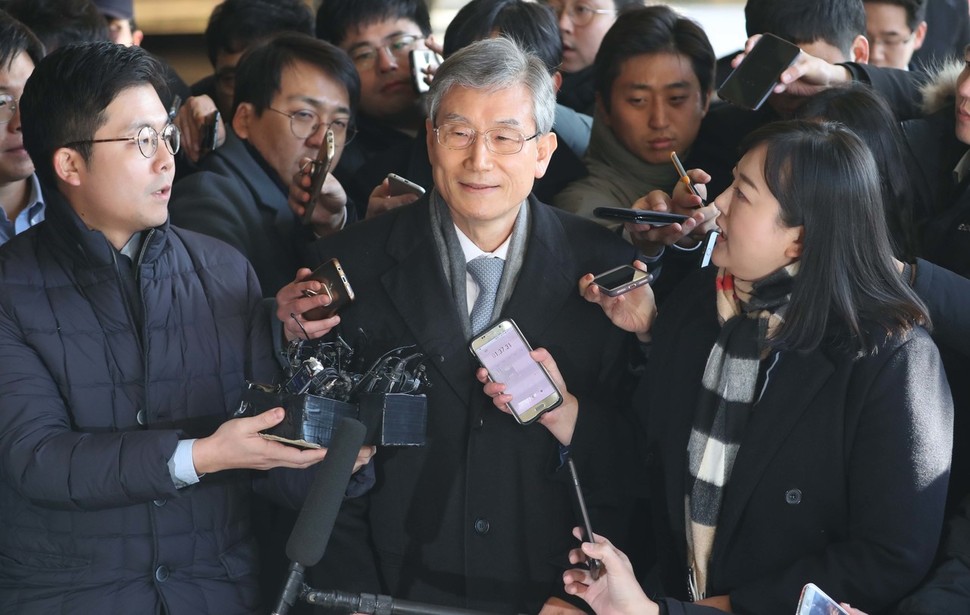Posted on : Dec.4,2018 17:41 KST
 |
|
Former Supreme Court Justice Park Byung-dae, a key suspect of judicial misconduct under the Park Geun-hye administration, enters the Supreme Prosecutors’ Office in Seoul on Nov. 19. (Shin So-young, staff photographer)
|
Investigation appears poised to target and indict former chief justice Yang Sung-tae
Prosecutors’ investigation of a scandal involving judicial misconduct and influence peddling is reaching its peak after a Dec. 3 request for arrest warrants against former Supreme Court Justices Park Byung-dae and Ko Young-han.
The first case in South Korea’s judicial history of arrest warrants being requested for former justices of the Supreme Court means that the issue is drawing major interest regardless of what decision the court makes in response to the request. The focus of the prosecutors’ investigation also appears poised to shift toward questioning and indicting the central figure in the case – former Supreme Court Chief Justice Yang Sung-tae – regardless of whether Park and Ko are also arrested.
Explaining its reasons for requesting the warrants, the Seoul Central District Prosecutors’ Office’s investigative team (headed by third assistant prosecutor general Han Dong-hoon) on the judicial influence scandal said on Dec. 3 that the charges against Park and Ko concern “crimes committed in the course of duties based on a hierarchical command relationship rather than being personal lapses on their part.”
“As the superiors exercising greater decision authority, they should be held rigorously accountable to a greater degree than their subordinate, former National Court Administration Deputy Director Im Jong-heon,” the team argued.
 |
|
Former Supreme Court Justice Ko young-han, suspected of judicial misconduct under the Park Geun-hye administration, is questioned by reporters as he enters the Supreme Prosecutors’ Office in Seoul for questioning on Nov. 23. (Park Jong-shik, staff photographer)
|
Park and Ko, who successively held the position of National Court Administration Director while Yang was Chief Justice from Feb. 2014 to May 2017, are suspected of ordering second-in-command Im to interfere in trials, monitor judges, and implement disadvantageous personnel decisions, while demanding reports on the measures. The texts of their arrest warrant requests alone stretched to 158 A4 pages for Park and 108 pages for Ko.
With then-subordinate Im already under arrest and indictment, the prosecutors concluded that his two superiors also needed to be placed under arrest for investigation.
“Both men have denied the charges against them and have made claims that differ from the accounts of their subordinates,” an official with the prosecutors said. Ko did reportedly acknowledge interference in trials in an effort to cover up a case involving judicial corruption in Busan.
With Im having already been amply investigated as the individual in charge of the “practical” end of the judicial scandal, the arrest warrant request comes two weeks after Park’s first open summons on Nov. 20 and ten days after Ko’s first questioning. The charges against them generally overlap with those against Im, who was arrested and indicted for abuse of authority and obstruction of the exercising of rights.
On Im’s indictment, Park was listed 31 times and Ko 18 times as an “accomplice.” Also included were the drafting of a “judges’ blacklist” and disadvantageous treatment – the key charges common to Yang, Park, and Ko.
The decision on Park and Ko’s arrest is scheduled to come by the evening of Dec. 6. After seeming to die down when Im’s arrest was allowed in late October, controversy continues to rage over the dismissal of warrant requests. A court recently granted search-and-seizure warrants for just two of over 130 judges with personnel information in connection with blacklist charges. Having served in major National Court Administration positions and as presidents of individual courts, both Park and Ko hold professional connections with the chief judges responsible for warrants at Seoul Central District Courts. The arrest warrant for Im was issued by Im Min-seong, a warrant judge with no previous experience working at the National Court Administration.
The arrest decision appears difficult to predict. Both former Supreme Court Justices reportedly denied the charges under questioning by prosecutors, claiming the orders had been “legitimate” and that subordinates had “acted on their own.” If the court does issue arrest warrants for both men in addition to Im’s, it raises the likelihood of the unprecedented arrest of a former Supreme Court Chief Justice as well. Conversely, a denial of their arrest warrants is expected to create a serious backlash and burden for the court. Some observers in the legal community predicted the court may only issue an arrest warrant for Park, whose charges are relatively more serious.
By Choi Woo-ri and Kim Yang-jin, staff reporters
Please direct comments or questions to [english@hani.co.kr]










